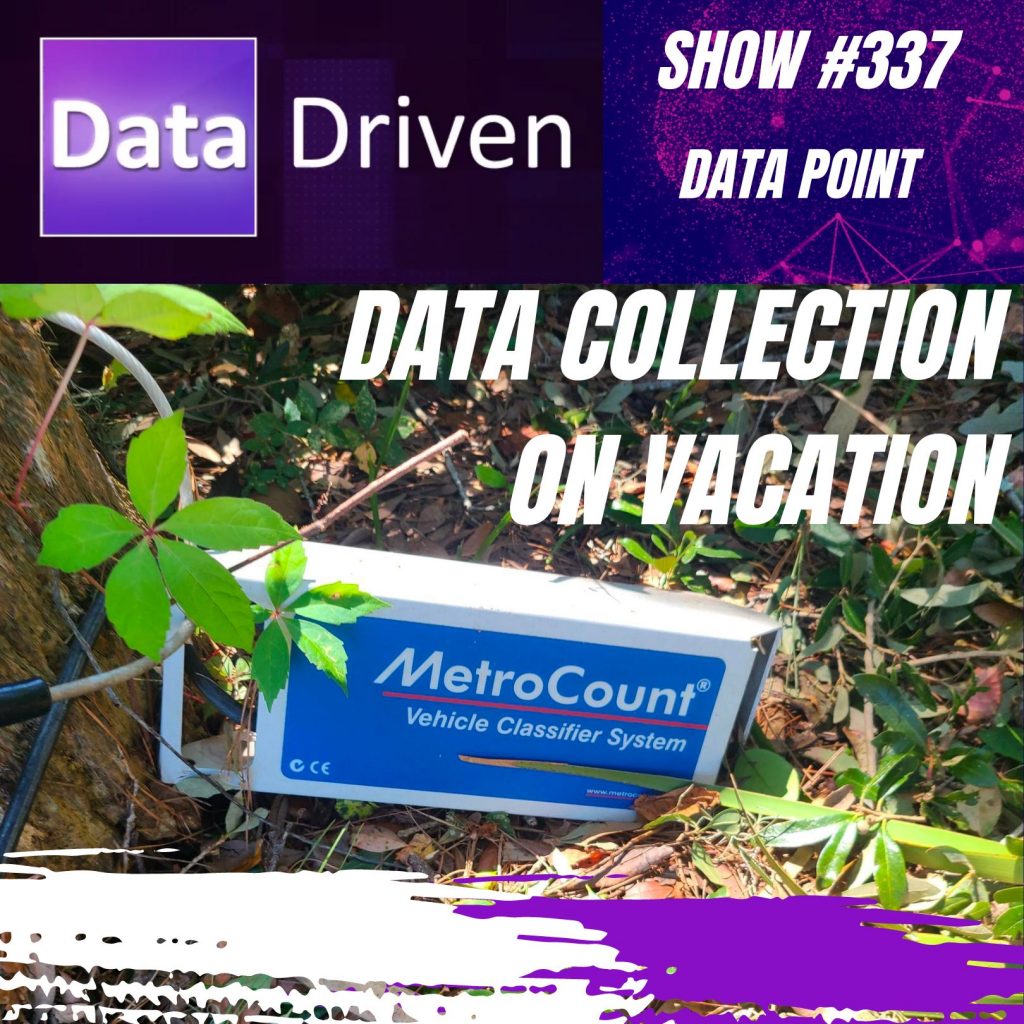*Data Point* Data Collection on Vacation

In this Data Point, Frank notices something on the side of bike trail while on vacation. You can tell he’s always thinking about data.
Metrocount
Original Video Stream
https://www.linkedin.com/video/live/urn:li:ugcPost:7103044990578110464/
Merch
If you like the shirt Frank is wearing in the video, you can pick one up here: https://amzn.to/3OVkOHz
Discussion Questions
1. How does the presence of the Metro Count device in Hilton Head Island impact data collection on bike trails?
2. What can the Metro Count device detect and analyze in terms of user activity on the bike trails?
3. What potential applications can the data collected from the Metro Count device have for the community?
4. How might the data collected from the Metro Count device be used to improve maintenance and upkeep of the bike trails?
5. Do you think the data collected from the Metro Count device can help enforce regulations, such as the use of E-scooters?
6. How does the presence of data collection devices, like the Metro Count, influence our daily lives even when we are on vacation?
7. Can you think of any other innovative ways data collection devices like the Metro Count can be utilized in other locations?
8. What challenges or limitations might arise from using the Metro Count device for data collection?
9. How can the data collected from the Metro Count device contribute to urban planning and infrastructure development?
10. Can you envision any privacy concerns or ethical considerations related to the use of data collection devices like the Metro Count?
Transcript
In this data point, frank notices a unique data collection
Speaker:device while on holiday in Hilton Head, South Carolina.
Speaker:Well, hello, LinkedIn, YouTube, Facebook, Twitch,
Speaker:and Twitter or X or whatever it's called
Speaker:this week. My name is Frank Lavinia. And I am
Speaker:Juan. I'm on vacation in
Speaker:Hilton Head, South Carolina. And one of the things
Speaker:that happened was hurricane
Speaker:ran through here. But fortunately, by the time IoT got to us, it was
Speaker:pretty weak. We didn't lose power. There are a lot of down trees and stuff
Speaker:like that, but one of the things
Speaker:we were watching, the Weather Channel, apparently Florida got hit really bad, I think
Speaker:big Bend, Florida. My thoughts and prayers
Speaker:go out to them. It looks like it was pretty badly hit. Could have been
Speaker:worse, I guess. But still, a category three hurricane is
Speaker:nothing to play games with.
Speaker:But the thing I wanted to talk about here, yes,
Speaker:maybe it was a category four, you're right. My production assistant here,
Speaker:who has been helping me test out the system,
Speaker:I'll explain what I'm testing out in a
Speaker:so actually, a couple of interesting
Speaker:bikes just went by. One of the great things about
Speaker:Hildehead Island, aside from IoT being on the sea and all that, is that there's
Speaker:a number of bike trails through here, although the sign calls them
Speaker:leisure trails because they're not strictly for bikes. People run on them, people
Speaker:walk on them, people take their scooters on them,
Speaker:et cetera, et cetera. So one of the things I noticed actually a couple of
Speaker:days ago, and this proves that I'm always thinking about data, but I guess you
Speaker:already knew that. Is there's
Speaker:something here I saw in two different places, and I think it's interesting,
Speaker:I've seen some variant of these along highways throughout my
Speaker:life, but it's called Metro Count.
Speaker:And from what I can tell,
Speaker:it's bolted to the tree for one. Right. So I did a
Speaker:quick actually, the URL is right down there, metrocount.com.
Speaker:Not a commercial for Metrocount. I did a quick look
Speaker:at their website. Apparently what they do is that they have these sensors in the
Speaker:ground, and if you can see them, hopefully you
Speaker:can see them. And
Speaker:what this does let's see what the other end looks like.
Speaker:These are two separate, according to the website, pneumatic
Speaker:tubes that are placed about this far apart.
Speaker:Sorry. And here goes a bike
Speaker:now, kind of see, and for those of you listening to
Speaker:this on the podcast, I will be sure to include links and stuff and
Speaker:pictures. But
Speaker:I've seen this in a couple of places here within this particular resort,
Speaker:and I can only guess that they're trying to figure out
Speaker:how much use people are getting on the bike trails. I don't know
Speaker:why, but it is probably going to be an interesting data point. They have these
Speaker:in I've seen at least two places here, these Metro Count
Speaker:systems. And I looked at their
Speaker:website briefly, and apparently they
Speaker:can tell between pedestrians,
Speaker:bikes and vehicles like cars.
Speaker:Cars and bikes, I think are pretty easy to figure out. Pedestrians, I
Speaker:suppose if one gets hit and the other one doesn't,
Speaker:they might do that. Plus there's also the timing incident of it. And
Speaker:there's actually a pretty lengthy section there.
Speaker:The data analytics. The data, they do analytics or they provide
Speaker:analytics and presumably an AI model of some sort.
Speaker:They can tell you what type of vehicle it is. So
Speaker:my junior engineer here
Speaker:was running back and forth in this scooter hoping to see would we know,
Speaker:right, that's what you were doing, you were trying to see if it registered the
Speaker:scooter. So we don't have access to the data that it's
Speaker:producing, but we can infer that it could
Speaker:probably tell based on the timing and the
Speaker:weight. It could definitely tell between bikes. It might even be able to tell between
Speaker:kids bikes and adult bikes. Obviously, vehicles
Speaker:are going to be much heavier and the timing of it, they can probably,
Speaker:based on the distance infer the speed, the
Speaker:distance apart. Although since it's not really fixed, you can,
Speaker:I guess, mess with the wiring and kind of mess that up. I
Speaker:don't know. But I just
Speaker:find it interesting that they are collecting this type of data
Speaker:on the island and I didn't get to shows you that data is everywhere.
Speaker:Right? So just a fascinating look
Speaker:kind of at the box, one last look at the box. And
Speaker:if anyone within the sound of my voice works for Metro Count, I'll speak
Speaker:for Andy here. Usually I don't like speaking for Andy, but I would love to
Speaker:have you, I'm sure Andy would too love to have you on the show and
Speaker:kind of talk about how this is used and how this works. Obviously nothing
Speaker:proprietary, but I would imagine what this is doing is this is
Speaker:let's call it what is, right? It's an edge device, right? And it's probably
Speaker:I don't see an antenna, but that doesn't mean anything anymore.
Speaker:And I left my radio wave detection thing
Speaker:at home, which I wanted to
Speaker:bring it, but the missus wasn't really into that.
Speaker:These are the conversations that engineer families have.
Speaker:But I think it's interesting. I'd love to know kind of like so
Speaker:I'm assuming that these are some kind of robotic tubes based on what the website
Speaker:described. And there's some kind of sensor in there, in here
Speaker:that will register probably both timestamp and
Speaker:the amount of pressure and weight, potentially. And I lost. There he
Speaker:is. Probably that's how they do it. He's jumping over
Speaker:it. So if you don't touch any of those, it doesn't register you.
Speaker:So I guess a hoverboard, a proper hoverboard like from Back to the Future would
Speaker:not register. Although if
Speaker:the antigravity pad would do that. So these are the types of
Speaker:we're going into nerd territory here. You're going to put a leaf on it. You
Speaker:think a leaf will register? Probably not. I don't know. We'll find out.
Speaker:Someone's going to be looking at this data and being like, what the heck?
Speaker:There's a leaf on this. Assuming it's that sensitive.
Speaker:What I'm assuming is happening here, I'm kind of reverse engineering this on the fly,
Speaker:is that whatever weight gets pushed on there moves some
Speaker:bit of air through the system. That device there
Speaker:will register it, presumably to timestamp, too. There's probably
Speaker:at least two, I would imagine, right? One for each one. And
Speaker:I suppose one measures speed, and the
Speaker:other one measures weight. And you have timing. You can kind of figure out
Speaker:you can assume the weight. You can infer the weight and get
Speaker:the weight, but you can infer the speed based on how that's going.
Speaker:So I don't know. I just think it's interesting. It's kind of sad that I'm
Speaker:on vacation, and I'm still thinking about data, but I
Speaker:didn't choose data life. Data life chose me. So from
Speaker:sunny Hilton Head Island. No,
Speaker:no, it's good on the vacation. It's just kind of funny that I'm thinking about
Speaker:data and stuff like that. But as I said, I didn't choose a data
Speaker:life. The data life chose me. And the little one wants to
Speaker:go back to the beach. I can't say IoT I blame him. So from Sunny
Speaker:we're going to go back to the beach. I promise. This is like the Dunkin
Speaker:Donuts episode all over again. All right, just
Speaker:just 1 second. I'm going to close this out. So thanks for watching, and thanks
Speaker:for listening, because I'm going to make this a data driven episode, too. But I
Speaker:just think it's cool, and I just think it's interesting that I'm curious
Speaker:how the community is going to use this data. Are they trying to justify the
Speaker:maintenance, the upkeep on these things, and they're just trying to get
Speaker:raw data on how this is used? How many people do it? I do wonder,
Speaker:since E Scooters are technically not allowed, are they going to
Speaker:use this to kind of figure out Escooters? I'm not saying
Speaker:I know anyone in my family that has an E Scooter with us. I'm not
Speaker:saying that. I'm just saying let's put it out there. I wonder if they're trying
Speaker:to detect hoverboards and things like that with this system.
Speaker:So with that, I'm going to end this
Speaker:and signing off from Sunny Hill Head, South Carolina, and
